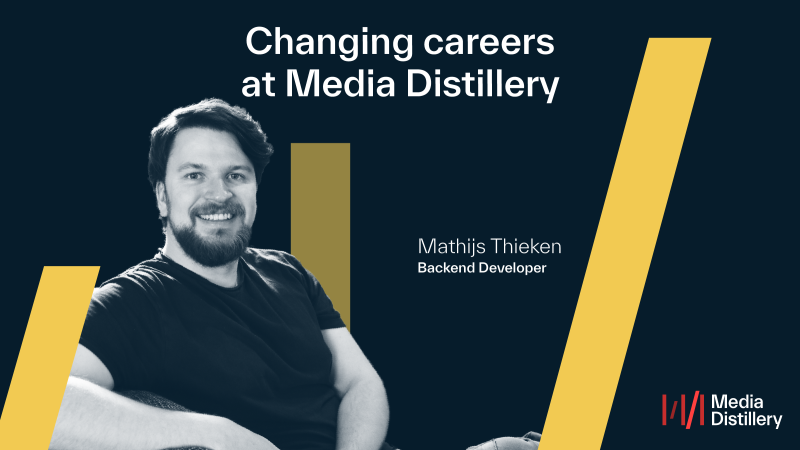From Writing Music to Writing Software: Changing Careers at Media Distillery
Mathijs Tieken, who joined Media Distillery 3 years ago as a Product Support Agent and has since switched into a Media Backend Engineer, talked with us about his career transition from music composer, and how he balances his time between music and backend engineering.

Mathijs Tieken about his career transition
My name is Mathijs Tieken, I am 34 years old, born and raised in Amsterdam. I'm a Backend engineer at Media Distillery, where I work on the software side behind the AI applications.
How did you start at Media Distillery?
Prior to working at Media Distillery, I was trying to make a living as a music composer. Sometimes I succeeded, sometimes less so. I figured I needed a steady part-time job on the side.
When I saw a Media Distillery advertisement for a product support engineer, I said to myself: “Yeah, they're probably not going to look at my profile at all. But I'll shoot anyway.” Then, they invited me for a conversation. I guess it sort of clicked. And the rest is history.
I did product support for a total of 8 months. After half a year I started looking for a different challenge. I was interested in what backend engineers are doing at Media Distillery. My background was in biomedical sciences, so I wasn’t sure where to start.
I asked a senior back-end developer colleague about courses and traineeships, to get a good starting point. Instead, he suggested I could start as a DevOps Engineer the next week. Unlike Backend developers, a DevOps Engineer doesn’t write code directly, but they get to execute the program so it gives a result. For that, I could get started without direct coding experience.
How did you learn?
My colleagues invested a lot of time in just showing how everything works. I was told: “See if you like it. If you don't, you can always go back to your old job. But if you do, we can continue this way”. I really liked it, and a couple of months later I was officially a junior DevOps engineer. Altogether, the transition took 8 months.
As a DevOps Engineer, I had to deploy applications, meaning placing them somewhere and running the application. Sounds easy, but it can be logistically challenging. Learning was a gradual process: I started with basic commands, and I had an “Imposter syndrome”, because I haven't studied for this at all. But with time, I gained more knowledge and this feeling faded.
I must say that Corona helped me because we all had to stay home and work remotely. I took my time learning, like simple Udemy online courses. I was learning Java by myself. When I felt comfortable enough, I was assigned a bug one day. One of our old colleagues sat with me and we started hunting together. He nudged me in the right direction. In the end, we found a single line with a problem.
I fixed it, pulled a done request, and was like: “Gosh, it's my first code change. This is great!”
From there it gradually escalated into full-on development. At the start, I was unfamiliar with all the concepts in Java. But as you see the problems, you start to see some repetition and become more comfortable with it.
How did Media Distillery support your transition?
There are loads of companies that tend to pigeonhole their employees, so they cannot step outside of their lane. If you are to learn something, you do that in your own time.
Media Distillery is more open in this regard, which is great because it allows people to sort of step outside their comfort zone and learn new things.
It costs a little bit more time and effort, but then you have a broader skill set that benefits both sides at the end of the day. Therefore, most of the company values like autonomy and courage, at least in my experience, align with reality. Of course, you have to discuss big changes with people, but there was never anyone to tell me I am not allowed to do this. I think this openness is great.
Compared to your music career, how does your current job help you to fulfil your potential?
Coming from music, I worked as a freelancer, which means a new challenge every day, but also great uncertainty.
My current job, on the other hand, gave me stability and allowed me to work in a big team with different people. Because we work autonomously, I get challenged with finding a solution. For me, going down this rabbit hole to find answers is extremely rewarding.
Within my music experience, there have been many conflicts that I had to resolve. So I had soft skills, which I used as a strength, especially at the start. Although technically I wasn’t up to par, my skills in teaming up, avoiding, and resolving conflicts were really useful.
What were the most helpful and the most difficult parts of this transition?
For starters, I rarely felt that people were gatekeeping. I just felt encouraged by most of my colleagues, and they were always open to teaching some stuff. A big motivator was that they never forgot to mention my achievements, especially for me as a newbie.
The most difficult part of this transition, besides I didn’t have much knowledge from the start, was the patience to figure out every single detail.
What is the most important lesson that you learned from this?
It is never too late to pick a new trajectory. Before, life felt like it was set in stone: if I studied A, I had to do B. This whole experience has taught me that not only can you change it, but it can also be super rewarding. I am happier professionally now than when I was still full-time focusing on music. Back then, I would think that I must be 100% successful in music, and anything else is a failure.
I’m really glad that I'm doing these two trajectories on the side. That’s a different type of challenge, way more fun, and way more exciting.
What I noticed and liked, is that when you are strung up to finding a solution, your mind can reset while doing a different type of work. And when you get back to it, you look at it with fresh eyes.
What do you like about working at Media Distillery?
I like that the culture is super open, and it's a flat hierarchy. The distance between any employee and CEO is really small, you can always have a discussion with anyone if you disagree with something.
And no matter how typical it sounds, it’s the people. With all the people who have been working here over these 3 years, we somehow really get along.
They are just super friendly people to work with, and that I genuinely like to have a drink with or go out with.
We had the proper trip up Prague not too long ago. I had a blast there for 4days, going out to clubs and having fun with my co-workers.
December 6, 2022
